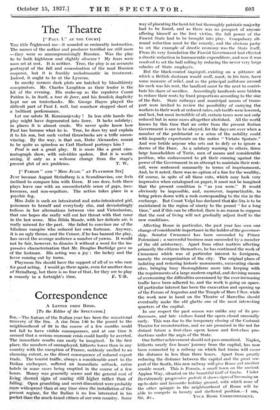Correspondence
A LETTER FROM ROME.
[To the Editor of the SPECTATOR.] SIR,—The feature of the Italian year has been the sensational recovery of the lira. A rise from 140 to the pound to the neighbourhood of 90 in the course of a few months could not fail to have visible consequences, and at one time it seemed that a serious economic crisis could hardly be averted. The immediate results can easily be imagined. In the first place, the numbers of unemployed, hitherto lower than in any country with the exception of France, suddenly swelled to an alarming extent, as the direct consequence of reduced export trade. The tourist traffic, always a considerable asset to the Italian exchequer, suffered an immediate setback, entire hdtels in some cases being emptied in the course of a few hours. Money was generally scarce and the general cost of living showed signs of soaring still higher rather than of falling; Open grumbling and secret discontent were probably ,inore widespread than at any time since the installation of the present reginie, for the Italian is no leas' interested in his pocket than the inuch-taxed citizen of our own country. Sonie way of placating the hard-hit but thoroughly patriotic majority had to be found, and as there was no prospect of anyone offering himself as the first victim, the full power of the Fascist State had to be brought into play. Compulsory all- round reduction must be the remedy, and the obvious party to set the example of drastic economy was the State itself. From its very foundation the Fascist Government had effected a drastic reduction in bureaucratic expenditure, and now it was resolved to set the ball rolling by reducing the never very large salaries of State employes.
But the black-coated impiegati, existing on a pittance at which a British dustman would scoff, must, in his turn, have some measure of relief, and as the principal millstone around his neck was his rent, the landlord must be the next to contri- bute his share of sacrifice. Accordingly landlords were bidden to reduce their rents by fixed proportions according to the size of the flats. State railways and municipal means of trans- port were invited to review the possibility of carrying the workers to their work at reduced rates, cab tariffs were lowered, and last, but most incredible of all, certain taxes were not only reduced but in some cases altogether abolished. All the world knows by this time that an order from the present Italian Government is one to be obeyed, for the days are over when a member of the proletariat or a scion of the nobility could with impunity expectorate on the notice " Vietato Sputare." And woe betide anyone who sets out to defy or to ignore a decree of the Duce. As a salutary warning to others, three large householders of Turin, men of means and 'considerable position, who endeavoured to pit their cunning against the power of the Government in an attempt to maintain their rent- roll, were sentenced summarily to terms of imprisonment. And, be it noted, there was no option of a fine for the wealthy. Of course, in spite of all these cuts, which may look very impressive when catalogued on paper, it must not be imagined that the present condition is " as you were." It would obviously be impossible, and, moreover, impracticable, to bring prices down with a rush corresponding to the rise in the exchange. But Count Volpi has declared that the lira is to be maintained in the region of ninety to the pound " for a long time," and if this can be effected, there is no reason to suppose that the cost of living will not gradually adjust itself to the new conditions.
Affecting Rome in particular, the past year has seen one change of considerable importance in the holder of the governor- ship. Senator Cremonesi has been succeeded by Prince Potenziani ; a successful business man succeeded by a member of the old aristocracy. Apart from other matters affecting primarily the citizens themselves, he has continued the work of Cremonesi which was of particular interest to foreigners, namely the reorganization of the city. The original plans of isolating and restoring historic monuments, excavating classic sites, bringing busy thoroughfares more into keeping with the requirements of a large modern capital, and devising means of overcoming the difficulties occasioned by the ever-increasing traffic have been adhered to, and the work is going on apace. Of particular interest has been the excavation and opening up of the Forum of Augustus and the Temple of Mars Ultor, while the work now in hand on the Theatre of Marcellus should eventually make the old ghetto one of the most interesting quarters of the capital.
In one respect the past season was unlike any of its pre- decessors, and late visitors found the opera closed unusually early. This was due to the temporary closing of the Costanzi Theatre for reconstruction, and we are promised in the not far distant future a first-class opera house and first-class pro- ductions under the aegis of the State.
One further achievement should not pass unnoticed. Naples, hitherto nearly five hours' journey from the capital, has now been connected by a railway on which fast trains will cover the distance in less than three hours. Apart from greatly reducing the distance between the capital and the great sea- port of the South, this new railway will give Rome yet another
seaside resort. This is Formia, a small town on the ancient Appian Way, situated on the beautiful Gulf of Gaeta. Under its extremely progressive podesta it shows signs of becoming an up-to-date and favourite holiday ground, with which none of the other spiaggie in the neighbourhood of Rome will be able to compete in beauty and sheltered position.—I am,


















































 Previous page
Previous page